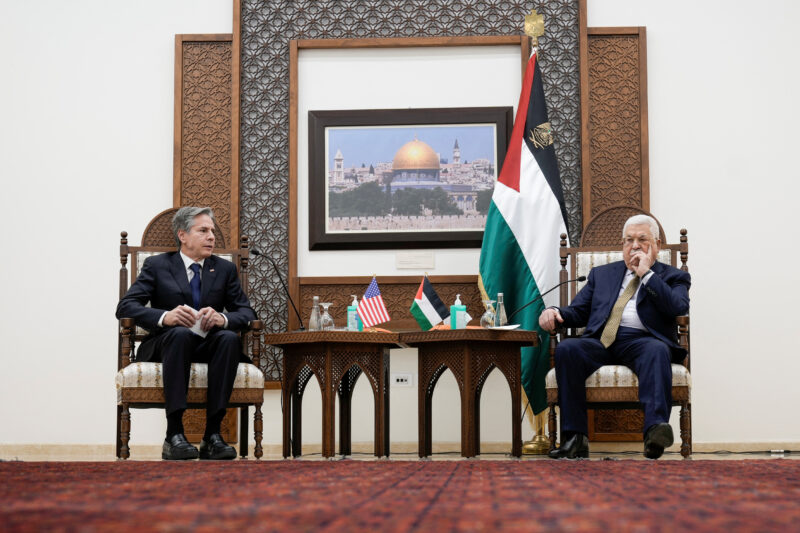RAMALLAH, West Bank (Reuters) -U.S. Secretary of State Antony Blinken shuttled from Israel to the Palestinians’ West Bank on Tuesday, appealing for an end to resurgent violence and reaffirming Washington’s backing for a two-state solution to the decades-long conflict.
Blinken is urging calm on both sides after last week’s killing by a Palestinian gunman of seven people outside a Jerusalem synagogue and anger among Palestinians over actions by Israeli forces and settlers in the occupied West Bank.
“That’s the only way that we can create conditions in which people’s sense of security will start to improve,” he told a news conference in Jerusalem.
He took that message into a meeting with Palestinian President Mahmoud Abbas in Ramallah, warning all parties against any action that could threaten a two-state solution, with an independent Palestinian state alongside Israel.
“We’ve been clear that this includes things like settlement expansion, the legalization of outposts, demolitions and evictions, disruptions to the historic status of the holy sites, and of course incitement and acquiescence to violence.”
He said he had heard “deep concern” about the current trajectory in both Israel and the West Bank but also constructive ideas and he had asked senior officials to remain behind to continue talking.
A senior State Department official said the officials staying would be Barbara Leaf, the top department official for the Middle East, and Hady Amr, U.S. special representative for Palestinian affairs.
Blinken’s first visit since Prime Minister Benjamin Netanyahu returned to power this month at the head of one of the most right-wing governments in Israel’s history comes at a time of extreme tension between the two sides.
He said Palestinians were facing a “shrinking horizon of hope” that needed to change.
Amid rising anger at near-daily raids by Israeli forces in the West Bank, Abbas’ Palestinian Authority (PA) suspended its security cooperation agreement with Israel last week after the largest incursion in years.
The operation saw Israeli forces penetrate deep into a refugee camp in the northern city of Jenin, setting off a gunfight in which 10 Palestinians died.
“The Israeli government is responsible for what is happening today, because of its practices that undermine the two-state solution and violate the signed agreements,” Abbas said after his meeting with Blinken.
BLOODY JANUARY
In January alone, 35 Palestinians have been killed in clashes with Israeli troops, in the bloodiest month since 2015, while officials say attacks on Palestinian property by Israeli settlers have also increased.
The raids have been going on almost daily for months as Israeli forces have stepped up a crackdown on militant groups in the West Bank following a spate of deadly attacks by Palestinians in Israel last year.
Blinken also highlighted U.S. assistance to the Palestinian economy, which is heavily dependent on foreign aid.
He said the United States would provide an extra $50 million in funding through the United Nations and that agreement had been reached on providing high speed 4G telecoms services to Palestinians.
Before meeting Abbas, Blinken visited Deir Dibwan, a town near Ramallah that is home to many Palestinian Americans, and met civil society leaders and businesspeople.
Netanyahu has reinforced troops in the West Bank and promised measures to strengthen settlements there, but has said Israel was not looking to escalate the situation.
On Tuesday, Blinken met Israeli Defence Minister Yoav Gallant and discussed cooperation to stop Iran developing a nuclear weapon as well the situation in the West Bank.
Hopes of achieving a two-state solution, with a Palestinian state based largely in the West Bank, have all but disappeared since the last round of U.S.-sponsored talks stalled in 2014.
The Biden administration has said it would reestablish a consulate for Palestinians shuttered by former President Donald Trump, but has yet to say when or where it will be opened.
(Writing by James Mackenzie;Editing by Andrew Cawthorne and Bernadette Baum)

